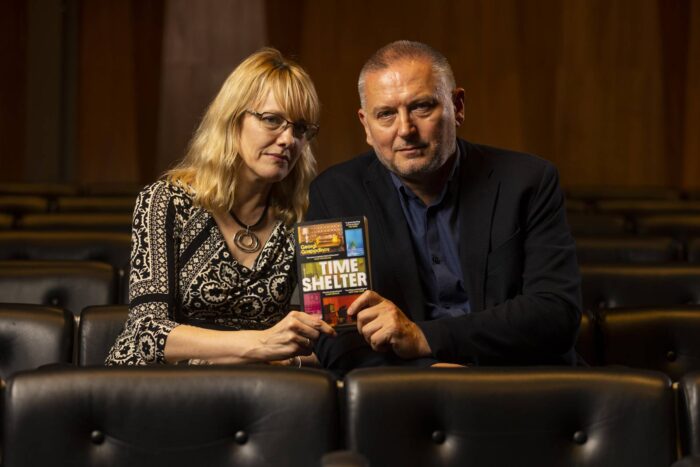This website uses cookies so that we can provide you with the best user experience possible. Cookie information is stored in your browser and performs functions such as recognising you when you return to our website and helping our team to understand which sections of the website you find most interesting and useful.
Keep up to date in the world of translation
International Booker Prize 2023
The Booker prizes have a mirroring relationship: they award fiction books written in English (the Booker) and fiction books translated into English (the International Booker). The International Booker Prize is an international literary award hosted in the UK, which awards a living author of any nationality for a book translated into English and published in the United Kingdom or Ireland. The winning title receives £50,000, shared equally between author and translator, and international recognition.
The International Booker Prize has a major factor in increasing the profile of translated fiction into English. Last year’s winner, the Hindi-language novel Tomb of Sand written by Indian author Geetanjali Shree and translated by Daisy Rockwell, went from selling fewer than 500 copies to around 25,000 copies.
International Booker Prize 2023
This years’s winning title is Time Shelter by the Bulgarian author Georgi Gospodinov, translated by Angela Rodel. It was announced at a ceremony at the Sky Garden in London on Tuesday, 23 May 2023.
The 2023 longlist had a global span from Mexico to the Ivory Coast, Sweden to South Korea. In numbers, the 2023 shortlist covered 4 continents, 2 languages represented for the first time (Bulgarian and Catalan), and translators from 5 countries.
This year’s Shortlist:
- Still Born by Mexican author Guadalupe Nettel, translated by Rosalind Harvey
- Standing Heavy by Ivorian author GauZ’, translated by Frank Wynne
- Time Shelter by Bulgarian author Georgi Gospodinov, translated by Angela Rodel
- The Gospel According to the New World by French author Maryse Condé, translated by Richard Philcox
- Whale by Korean author – Cheon Myeong-kwan, translated by Chi-Young Kim
- Boulder by Spanish author Eva Baltasar, translated by Julia Sanches
What the author said
Time Shelter writes about a ‘clinic for the past’ run by an enigmatic therapist who aims to treat Alzheimer’s disease. Patients find themselves transported back in time to happier, safer and more familiar times. However, healthy people begin to seek refuge there as they look to escape modern life. The book poses questions such as, ‘how does the past impact the present?’; when countries want referendums on the past ‘which versions of the past should shape a nation’s future?’, and ‘how do we decide what to remember, and what to forget?’. It interrogates the dangers of selective memory, inheritance of trauma, and the weaponisation of nostalgia.
Angela Rodel, the translator, won the 2016 AATSEEL (AMERICAN ASSOCIATION OF TEACHERS OF SLAVIC AND EAST EUROPEAN LANGUAGES) prize for Literary Translation. She was also awarded Bulgarian citizenship for her translation work and contribution to its culture. She began working on the translation of Time Shelter before Georgi Gospodinov had even finished writing it in Bulgarian.
‘I come from a system that sold a bright future under communism. Now the stakes have shifted, and populists are selling a bright past… that’s why I wanted to tell this story about the ‘referendums on the past’, undertaken by every European country. How does one live with a deficit of meaning and future?’

What are the numbers of translated fiction in the UK?
The most recent data, compiled by Nielsen on behalf of the Booker Prize Foundation shows that in the UK readers of translated fiction (TF) are significantly younger than readers of fiction generally, as well as revealing that a much higher proportion of male readers are buying translated fiction than fiction overall. 53% of people say they read translated fiction as they want a challenging read.
In 2022, over 1.9 million translated fiction titles were sold in the UK, which accounted for 3.3% of overall fiction sales.
When broken down by gender, the largest purchase group for translated fiction is females aged 13-24 years old. Only 32% of buyers of fiction are generally male, 48% of translated fiction buyers are male.
In the UK, the Top 10 languages of translated fiction are Japanese, French, German, Italian, Norwegian, Spanish, Swedish, Portuguese and Chinese.
Etymax is a London-based translation company and specialised language service provider to companies in the sports and tourism industries. If you would like us to help you translate and localise your web site, brand name, product and marketing materials for all your global markets, simply contact us.
Etymax: optimum performance. In every language.
Get in touch about your project.
Request a quotation or get in touch with our team to discuss your requirements. We look forward to helping you with your next project.




